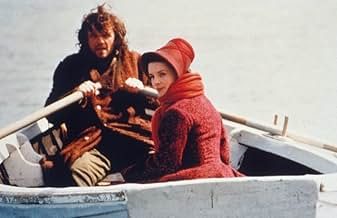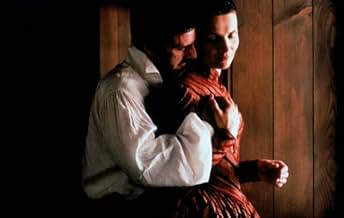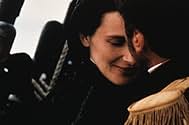VALUTAZIONE IMDb
7,1/10
5822
LA TUA VALUTAZIONE
Aggiungi una trama nella tua linguaIn a small French colony, a drunken man kills someone. While a guillotine is being shipped in, he changes, becoming a good and popular man.In a small French colony, a drunken man kills someone. While a guillotine is being shipped in, he changes, becoming a good and popular man.In a small French colony, a drunken man kills someone. While a guillotine is being shipped in, he changes, becoming a good and popular man.
- Regia
- Sceneggiatura
- Star
- Premi
- 3 vittorie e 9 candidature totali
Recensioni in evidenza
8=G=
As the best of French cinema does so adroitly, "The Window of Saint-Pierre" tells most of it's story laconically with knowing looks and subtle behaviors while the story it tells is a relentlessly plodding drama of unspoken words and the emotions they evoke. "Widow..." is more about integrity, honor, love, and other intangibles than it is about its relatively simple storyline and the characters involved. A beautifully crafted somber film, "Widow..." is recommended for mature audiences because a measure of maturation is required to appreciate all this austere film has to offer.
This was a nice little film--not great, but nice--and on a grading scale, I'd give it a B or a B-.
Two points to add to what's already been said.
First, for those of you thinking of renting this movie (I rented it on DVD), DO NOT WATCH IT WITH THE ENGLISH DUBBING (available via the "Special Features - Audio" section of the DVD).
The dubbing is horrible; voices sound dubbed, rather than seeming to come from the actors themselves. Worse, I guess in order to make the words seem to match more closely with the movements of the actors' lips, the English dialogue is (IMHO) significantly different from the French! I watched the movie with English dubbing first, then in French with English subtitles. There is actually one point in the movie where someone asks, "Why did so-and-so do that?" The answer is completely different depending on whether you are watching the English or French translation.
The movie is best watched in French--hearing the actors' real voices works so much better than hearing the dubbed voices--with English subtitles, if you need the translation.
Second point: I was disappointed that no backstory (with respect to Le Capitain and La Capitaine) was forthcoming. I thought that the unfolding tale hinted at some sort of secret, something in his (and maybe her) past, that would shed more light on their current actions. In short, I felt that the couple's motivations and character were not sufficiently explored. And if this was because the movie wasn't particularly *about* motivations and in-depth character study, then I actually think that I would have preferred more overtly expressive actors. Enigmatic looks (IMO, that's what they were) without explanation don't really work for me.
Having said that, the movie was still a cut above your ordinary film, and worth the viewing.
Two points to add to what's already been said.
First, for those of you thinking of renting this movie (I rented it on DVD), DO NOT WATCH IT WITH THE ENGLISH DUBBING (available via the "Special Features - Audio" section of the DVD).
The dubbing is horrible; voices sound dubbed, rather than seeming to come from the actors themselves. Worse, I guess in order to make the words seem to match more closely with the movements of the actors' lips, the English dialogue is (IMHO) significantly different from the French! I watched the movie with English dubbing first, then in French with English subtitles. There is actually one point in the movie where someone asks, "Why did so-and-so do that?" The answer is completely different depending on whether you are watching the English or French translation.
The movie is best watched in French--hearing the actors' real voices works so much better than hearing the dubbed voices--with English subtitles, if you need the translation.
Second point: I was disappointed that no backstory (with respect to Le Capitain and La Capitaine) was forthcoming. I thought that the unfolding tale hinted at some sort of secret, something in his (and maybe her) past, that would shed more light on their current actions. In short, I felt that the couple's motivations and character were not sufficiently explored. And if this was because the movie wasn't particularly *about* motivations and in-depth character study, then I actually think that I would have preferred more overtly expressive actors. Enigmatic looks (IMO, that's what they were) without explanation don't really work for me.
Having said that, the movie was still a cut above your ordinary film, and worth the viewing.
The actions of two men on a drunken spree turns out to be fatal for the man who is being harassed because he dies as a consequence of a fight with his two tormentors. Both men are apprehended and condemned to die as punishment for their actions. The way to die is beheading by guillotine, or "the widow" in the vernacular.
Thus begins this story that director Patrice Leconte directed, based on the screen play by Claude Faraldo. The story is set in the remote island of Saint Pierre, off the coast of Newfoundland. This is a hostile environment settled by the French. Saint Pierre boasts a lot of widows who have survived the rigors of the climate and the hard lives their husbands led.
Into this milieu we find a military captain and his wife. Both are Parisians and appear to be compassionate, at heart. When Neel, the surviving drunk is brought to be kept in a cell within the military quarters of the island, the wife, Madame La, takes an interest in the man. With her husband's consent, she asks for his help in tending a green house in the premises and other errands.
Neel and Madame La are at simple view, just opposites. The kindness Neel sees in her, transforms him. Madame La even goes to help him learn to read. All these actions don't sit well with the rest of the inhabitants and the people in the government who demand a guillotine is sent over and have him execute the prisoner.
The film works because the brilliant performance of Juliette Binoche, who as Madame La, makes her mark in the picture. Her compassion for Neel is genuine; in her heart she believes this man, a product of the environment in which he was born, shows qualities that no one has seen in him.
Emir Kusturica, a noted film director himself, is also one of the assets of the movie. Mr. Kusturica is a large man with unkempt looks, who is totally believable as Neel. His interaction with Madame La turns from gratitude into a noble love that is not meant to be.
The other principal is Daniel Auteuil who is perfect as the captain, the husband of Madame La, who is outraged by what he perceives to be the wrong punishment for the accused Neel. In spite of the menacing presence of Neel next to his wife, he trusts her as he knows her kind heart belongs to him only.
"La veuve de Saint Pierre" is a great movie that will satisfy viewers in search of a different story. Patrice Leconte has directed with panache as he takes us to see the beauty of Saint Pierre, something that is so bleak, yet it's a place that has a magnetic attraction as we watch the film unfold.
Thus begins this story that director Patrice Leconte directed, based on the screen play by Claude Faraldo. The story is set in the remote island of Saint Pierre, off the coast of Newfoundland. This is a hostile environment settled by the French. Saint Pierre boasts a lot of widows who have survived the rigors of the climate and the hard lives their husbands led.
Into this milieu we find a military captain and his wife. Both are Parisians and appear to be compassionate, at heart. When Neel, the surviving drunk is brought to be kept in a cell within the military quarters of the island, the wife, Madame La, takes an interest in the man. With her husband's consent, she asks for his help in tending a green house in the premises and other errands.
Neel and Madame La are at simple view, just opposites. The kindness Neel sees in her, transforms him. Madame La even goes to help him learn to read. All these actions don't sit well with the rest of the inhabitants and the people in the government who demand a guillotine is sent over and have him execute the prisoner.
The film works because the brilliant performance of Juliette Binoche, who as Madame La, makes her mark in the picture. Her compassion for Neel is genuine; in her heart she believes this man, a product of the environment in which he was born, shows qualities that no one has seen in him.
Emir Kusturica, a noted film director himself, is also one of the assets of the movie. Mr. Kusturica is a large man with unkempt looks, who is totally believable as Neel. His interaction with Madame La turns from gratitude into a noble love that is not meant to be.
The other principal is Daniel Auteuil who is perfect as the captain, the husband of Madame La, who is outraged by what he perceives to be the wrong punishment for the accused Neel. In spite of the menacing presence of Neel next to his wife, he trusts her as he knows her kind heart belongs to him only.
"La veuve de Saint Pierre" is a great movie that will satisfy viewers in search of a different story. Patrice Leconte has directed with panache as he takes us to see the beauty of Saint Pierre, something that is so bleak, yet it's a place that has a magnetic attraction as we watch the film unfold.
The ancient Greeks, gifted with an abstract way of thinking that was always trying to come down to earth and clothe itself with the commonplace occurrences of everyday life, did not have one all-embracing term for love, a we do, but broke it down into four types: affection (storge), friendship (phileo), sex (eros) and charity (agapao). And probably not since the ancient Greeks has a love story come along which not only divides love into its four types, but also weaves them, with enormous skill, into a single story. The Widow of Saint-Pierre is a love story of the tragic Greek proportions. It's an enormously beautiful movie, a story that gains power with every viewing. And for that reason, it's one of the most remarkable videos I've seen in a very long time.
We've all seen a plethora of films from Hollywood, which basically confine love, and the act of love, to eros. We all know the well-worn script. But what would it look like to view a film in which a relationship expresses all four types of love, and throbbing full force? I would be giving too much away if I were to tell you how these four types of love are rolled up so tightly into a single relationship, but that's exactly what we seen in the liaison between Jean, the Captain (Auteuil) and his wife, Pauline (Binoche). It's intensely interesting, because the performances are pitch-perfect. Even the cowardly bureaucrats, who feel threatened by the captain and his wife, are a picture of cowardly perfection. Their motives are all too human, all too real. But so is the unfathomable love they don't understand, and fear.
One of the things I really appreciate about this film is the way it expresses all forms of love as having boundaries. Jean and Pauline are not clinging vines. What we see is a mature, healthy relationship, each partner respecting the unique characteristics of the other. What a contrast to the infantile clinging vine romances out of Hollywood!
We've all seen a plethora of films from Hollywood, which basically confine love, and the act of love, to eros. We all know the well-worn script. But what would it look like to view a film in which a relationship expresses all four types of love, and throbbing full force? I would be giving too much away if I were to tell you how these four types of love are rolled up so tightly into a single relationship, but that's exactly what we seen in the liaison between Jean, the Captain (Auteuil) and his wife, Pauline (Binoche). It's intensely interesting, because the performances are pitch-perfect. Even the cowardly bureaucrats, who feel threatened by the captain and his wife, are a picture of cowardly perfection. Their motives are all too human, all too real. But so is the unfathomable love they don't understand, and fear.
One of the things I really appreciate about this film is the way it expresses all forms of love as having boundaries. Jean and Pauline are not clinging vines. What we see is a mature, healthy relationship, each partner respecting the unique characteristics of the other. What a contrast to the infantile clinging vine romances out of Hollywood!
I have always been a Patrice Leconte devotee. His career in which incoherence and eclecticism get on well together (perhaps that's why he's often slated by French critics) is one of the most fruitful you could dream of, even if French mainstream public often associates his name with "les Bronzés" (1978), a commercial hit which put him on the map as well as the actors, the famous troupe of the Splendid and tends to overshadow the rest of his prolific career which spawned treasures like "Tandem" (1987), "Monsieur Hire" (1989) or "Le Mari De la Coiffeuse" (1990).
This vehicle "La Veuve De Saint Pierre" (2000) was originally to be directed by another veteran of French cinema Alain Corneau (who sadly shot the insipid "Prince Du Pacifique" that year, perhaps the nadir of his career) but he turned down the role due to disputes with the producers. So, Patrice Leconte inherited the project. His choice was motivated by the desire to work with one of the two main roles, Juliette Binoche (he had teamed up with Daniel Auteuil the previous year for "La Fille Sur Le Pont, 1999)
The title of the film has a double meaning: the "veuve" refers to Binoche after her husband's demise. The opening sequence presents her to us in her mourning garb (Leconte's work is served by lavish costumes). The audience knows that she is the "veuve" and will discover in the long flashback, how she has lost her husband. But a "veuve" is also a slang word for the sinister guillotine and it has a tongue-in-cheek connotation: Saint Pierre unlike France hasn't got a death instrument and must have one. All the time, the island is deprived of a guillotine, it remains a "veuve".
There are clearly two sides. On the one hand, the officers' who govern the island and are die-hards of the death sentence and on the other hand, the private triangle which encompasses Auteuil, Binoche and Kusturica. Between the two poles, the impending threat of the execution with the recurring images of the ship sailing across the Atlantic with on board the guillotine. The scenario eschews the tempting trap of the Manicheism and the officers aren't caricatures. As a matter of fact, one of the main thrusts of the film is to deride the leaders of the island who seek at all costs to keep the death sentence and their obstinacy is made ludicrous by the postpone of the sentence and the last words of the voice over contain grim details which give a slap to one of Doctor Guillotin's famous words: "a painless death is a progress for humanity". Moreover, they prove to be unscrupulous because when a new inhabitant settles on the island, they entrust him the role of the executioner without taking care of his opinion.
In the private triangle, madame La by guiding Neel on the way of redemption is full of condescension and solicitude but she's a complex character. Her reasons and motivations to redeem Neel are rather elusive even if she says (I don't remember the accurate cue): "I think human soul is unpredictable and can be able to become conscientious and intelligent. A little gratifying cue which should have been more construed and fleshed out and remains an inkling. Then, why would she encourage the sacrifice of such a devoted husband to try to save a convicted killer whereas it's doomed to failure? Is it a response to her husband's love? (If Auteuil sacrifices himself it's for love for his wife and respect for Neel). Certainly and if so, Leconte's piece of work is a novel and quirky approach on the relationship between husband and wife, a quite notable feat for an author who has seldom studied this topic in his filmography, except maybe in "Le Mari De La Coiffeuse".
Buoyed by a more than palatable cast with a special mention to Emir Kusturica who was a discerning choice because he could convey vulnerability and fragility to his persona of great strapping man, "La Veuve De Saint Pierre" may be derivative if we consider the theme of redemption and the thrust quoted in the fourth paragraph but its treatment is a far cry from Hollywood's formulaic conventions. How to rank it in Leconte's uneven but usually riveting filmography? It isn't on a par with his towering achievements but stands out as a more than palatable flick which however could have gained by being more deepened.
This vehicle "La Veuve De Saint Pierre" (2000) was originally to be directed by another veteran of French cinema Alain Corneau (who sadly shot the insipid "Prince Du Pacifique" that year, perhaps the nadir of his career) but he turned down the role due to disputes with the producers. So, Patrice Leconte inherited the project. His choice was motivated by the desire to work with one of the two main roles, Juliette Binoche (he had teamed up with Daniel Auteuil the previous year for "La Fille Sur Le Pont, 1999)
The title of the film has a double meaning: the "veuve" refers to Binoche after her husband's demise. The opening sequence presents her to us in her mourning garb (Leconte's work is served by lavish costumes). The audience knows that she is the "veuve" and will discover in the long flashback, how she has lost her husband. But a "veuve" is also a slang word for the sinister guillotine and it has a tongue-in-cheek connotation: Saint Pierre unlike France hasn't got a death instrument and must have one. All the time, the island is deprived of a guillotine, it remains a "veuve".
There are clearly two sides. On the one hand, the officers' who govern the island and are die-hards of the death sentence and on the other hand, the private triangle which encompasses Auteuil, Binoche and Kusturica. Between the two poles, the impending threat of the execution with the recurring images of the ship sailing across the Atlantic with on board the guillotine. The scenario eschews the tempting trap of the Manicheism and the officers aren't caricatures. As a matter of fact, one of the main thrusts of the film is to deride the leaders of the island who seek at all costs to keep the death sentence and their obstinacy is made ludicrous by the postpone of the sentence and the last words of the voice over contain grim details which give a slap to one of Doctor Guillotin's famous words: "a painless death is a progress for humanity". Moreover, they prove to be unscrupulous because when a new inhabitant settles on the island, they entrust him the role of the executioner without taking care of his opinion.
In the private triangle, madame La by guiding Neel on the way of redemption is full of condescension and solicitude but she's a complex character. Her reasons and motivations to redeem Neel are rather elusive even if she says (I don't remember the accurate cue): "I think human soul is unpredictable and can be able to become conscientious and intelligent. A little gratifying cue which should have been more construed and fleshed out and remains an inkling. Then, why would she encourage the sacrifice of such a devoted husband to try to save a convicted killer whereas it's doomed to failure? Is it a response to her husband's love? (If Auteuil sacrifices himself it's for love for his wife and respect for Neel). Certainly and if so, Leconte's piece of work is a novel and quirky approach on the relationship between husband and wife, a quite notable feat for an author who has seldom studied this topic in his filmography, except maybe in "Le Mari De La Coiffeuse".
Buoyed by a more than palatable cast with a special mention to Emir Kusturica who was a discerning choice because he could convey vulnerability and fragility to his persona of great strapping man, "La Veuve De Saint Pierre" may be derivative if we consider the theme of redemption and the thrust quoted in the fourth paragraph but its treatment is a far cry from Hollywood's formulaic conventions. How to rank it in Leconte's uneven but usually riveting filmography? It isn't on a par with his towering achievements but stands out as a more than palatable flick which however could have gained by being more deepened.
Lo sapevi?
- QuizThe film was to be completely filmed on the island of Saint-Pierre, but when the snow failed to arrive, the production had to move further north to Newfoundland for certain sequences.
- BlooperWhen Neel is told he's strong enough to "ramer jusqu'au chez les Anglais", the English subtitles say "row over to Canada" rather than "row over to the English". This introduces an error: both the geography and the dialogue in other scenes make it clear that Newfoundland is meant, but Newfoundland wasn't part of Canada until 1949.
- ConnessioniFeatured in The 58th Annual Golden Globe Awards 2001 (2001)
I più visti
Accedi per valutare e creare un elenco di titoli salvati per ottenere consigli personalizzati
- How long is Widow of St. Pierre?Powered by Alexa
Dettagli
- Data di uscita
- Paesi di origine
- Sito ufficiale
- Lingua
- Celebre anche come
- Widow of St. Pierre
- Luoghi delle riprese
- Fortress of Louisbourg, Louisbourg, Nuova Scozia, Canada(as Saint-Pierre)
- Aziende produttrici
- Vedi altri crediti dell’azienda su IMDbPro
Botteghino
- Budget
- 100.000.000 FRF (previsto)
- Lordo Stati Uniti e Canada
- 3.193.889 USD
- Fine settimana di apertura Stati Uniti e Canada
- 31.702 USD
- 4 mar 2001
- Lordo in tutto il mondo
- 7.193.889 USD
- Tempo di esecuzione
- 1h 52min(112 min)
- Colore
- Mix di suoni
- Proporzioni
- 2.35 : 1
Contribuisci a questa pagina
Suggerisci una modifica o aggiungi i contenuti mancanti
































